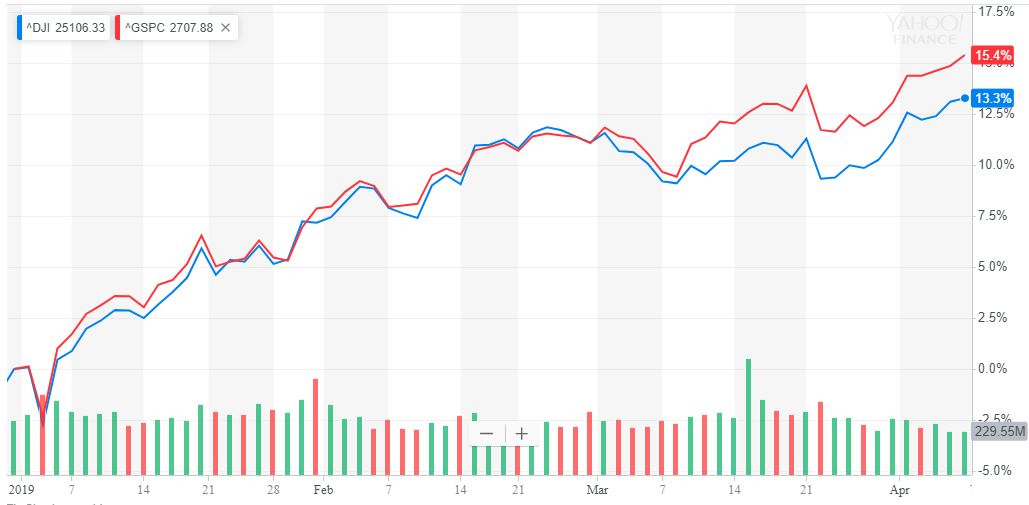While Dow Surges, Hedge Funds Underperform by Ridiculous Margin

Hedge funds are trailing the Dow and S&P 500 by a ridiculous margin in 2019. | Source: Shutterstock
Hedge fund managers had a miserable time in 2018. Just four months into 2019, things aren’t looking much better, even as the Dow Jones Industrial Average (DJIA) pounds toward a new all-time high.
Lousy fund performances should make investors wonder if they should steer clear of hedge funds, whose “expert” analysts and stock-pickers claim the ability to beat maximize returns but have been exposed as no better at forecasting the market than anyone else.
2018 and 2019 Put Hedge Fund Reliability in Question
Hedge funds haven’t just underperformed when the market is booming. 2018 wasn’t exactly a banner year either, as most funds underperformed the S&P 500 , which itself lost 6.7%.
Here are some examples of the performance losses of some high-profile fund managers in 2018.
- Third Point, founded by Daniel Loeb, lost about 11%, making 2018 its worst performance year since 2008.
- Greenlight Capital, managed by David Einhorn, lost 34%.
- Pershing Square Holdings, managed by Bill Ackman, was down about 0.7%.
- Atlantic Investment’s Cambrian Fund, managed by Alexander Roepers, lost 35%.
Through the first quarter of this year, things don’t seem to be looking that much better. Citing the Bloomberg Hedge Fund Database, ZeroHedge notes that hedge funds have climbed just 4.9% so far this year compared to 15.4% for the S&P 500 and 13.3% for the Dow.

Hedge Funds: Too Clever for Their Own Good?
Sophisticated investors choose hedge funds because of the stellar, gutsy reputations of their managers. When the markets are volatile, investing in hedge funds can reduce risk and add diversification.
A major drawback is that hedge funds have certain terms that limit liquidity and are highly opaque, notes Investopedia . This drawback can mitigate the perceived benefits.
Another mitigating factor with hedge funds is the sheer cost of investing in them. Hedge fund fees can include a 2% management fee on top of an eye-popping performance fee of about 20%. These fees go directly to the fund manager.
Investors who go with these fund managers are giving them free rein to invest in any asset class they see fit. Whether it be shorting stocks, investing in equities, or taking activist positions in a company, fund managers can pretty much do what they please.
The Balance summed up the oh-so-clever attitude of fund managers perfectly:
“You have nothing holding you back from throwing your money at fund managers to do what they will. But as Dr. Ian Malcolm famously said in ‘Jurassic Park’: ‘Your scientists were so preoccupied with whether or not they could, they didn’t stop to think if they should.’ The same holds for investors looking at hedge funds.”
But what happens when the manager’s confidence, greed, or a combination of both, leads them to make bad investment choices? We see the losses that plagued them in 2018.
DIY Investors Laugh as Dow Jones, S&P 500 Rallies Expose Hedge Fund Frauds
Trusting a hedge fund manager to make the wisest investment decisions can be a challenge. Many investors are seething over the losses they saw from their hedge fund investments considering the Dow was going through the roof.
As they should be.
Many analysts see equities moving even higher this year, while strategists believe that fund managers will double down on their bearish strategies, perhaps unwilling to admit their past mistakes.
As Crit Thomas, global market strategist at Touchstone Advisors, observed:
“[Hedge funds] are not participating because they see this rally as more driven by sentiment as opposed to underlying fundamentals. It’d be better visibility of a true turn in fundamentals that would bring them back in.”